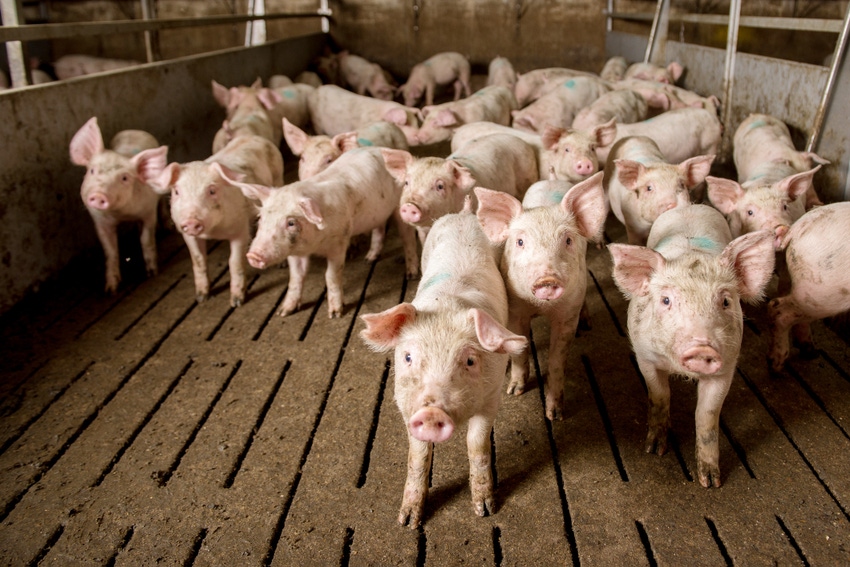Survey conducted by World Animal Protection found Thai consumers prefer pork from higher-welfare source and would like supermarket to offer such products.
November 8, 2018

A recent survey from World Animal Protection (WAP) has reported that animal welfare is among the top factors for Thai consumers to consider when choosing pork products. The survey found that Thai consumers prefer pork from a higher-welfare source and would like the supermarket to offer higher-welfare pork products.
WAP’s survey pointed out that consumers would reward supermarkets selling pork from higher-welfare farms, where pigs are allowed to exercise and behave naturally.
“Consumers do not want to see cages, neither barren pens nor painful piglet procedures which they found ‘shocking’ and ‘wrong’. They want to see [animals express their] natural behaviors and experience a life worth living. It is also important to investors. Many of the investors around the world are starting to look at animal welfare as an indicator because they see low animal welfare as a market risk. They also expect companies, like CP Group, to be consistent across their global operations” Dr. Kate Blaszak, global farm animal advisor, said in stressing the importance of animal welfare during a recent meeting with concerned experts at Charoen Pokphand Foods Public Co. Ltd. (CP Foods).
Consumers also expected supermarket to have a commitment against low welfare practices. More than 65% of consumers who participated in the survey said they would consider not doing business with a supermarket that sources pork products from low-welfare pig farms.
Moreover, antibiotic use at the farm level was identified as a concern among Thai consumers, with 86% surveyed worried about the use of antibiotics in pig production, mostly unaware they are often linked to stressful, barren conditions and painful procedures. The number is among the highest from surveys across the world. WAP added that low-welfare farms could lead to more frequent antibiotic use and higher chance of leaving antibiotic residue in the meat.
A growing interest in animal welfare among Thai consumers has led to a major shift in the industry’s practices in recent years.
CP Foods announced a global policy on animal welfare in April 2018 that is in line with internationally recognized animal welfare standards. The company said the practice aims to ensure consumers that all animals are raised with humane practices.
The key highlight for pig welfare is the company’s attempt to move toward group pen gestation, which allows mother pigs to move freely and express their natural behaviors. The global transition is expected to be completed within 2028.
To achieve the goal, CP Foods has consulted with experts across the world. During the recent workshop, Dr. Thomas D. Parsons, associate professor of swine production medicine with the New Bolton Center's department of clinical studies at the University of Pennsylvania School of Veterinary Medicine, said increasing consumer concerns about animal welfare, especially individual gestation stalls, have become a global trend. Moving toward better welfare for pigs is, therefore, inevitable.
“More and more customers are wondering where the food comes from, and it is important to understand that pigs are raised in ethical and safe way. That is driving a lot of the changes -- certainly [with] gestation. The movement from the gestation stall to pen gestation is a big part of the industry stepping forward to meet consumer demand.” he said.
Dr. Damnoen Chaturavittawong, senior vice president of the swine veterinary service department at CP Foods, added that the company has developed new approaches to phase out farming processes that may cause pain to animals. For example, it is using a rope test to collect diagnostic samples instead of collecting blood samples and using needle-free injection techniques to reduce pain and distress.
“Good welfare also helps the company to keep animals healthy, therefore, reducing reliance on antibiotics,” Damnoen pointed out, adding that “Antimicrobials and antibiotics are being used prudently under a strict veterinary supervision to ensure food safety of all pork products from the company. Animal welfare practices are implemented to keep animals healthy and prevent diseases that will further minimize the need for antimicrobial drugs.”
You May Also Like

.png?width=300&auto=webp&quality=80&disable=upscale)

